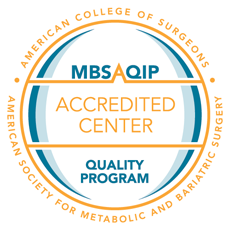Common Questions - Freedom from Obesity
Emergencies
For a serious emergency, go to your nearest emergency room.
In the event of an emergency after office hours, call the office number at: (318) 222-3132. The answering service will give you instructions and the doctor on call will be contacted.
Office Hours
Our Regular Office Hours are:
Monday through Thursday
9 am - Noon and 1:00 pm - 5:00 pm
Friday 9:00 am - Noon
Appointments
To make an appointment, please call 318.222.3132 and press extension 2 to reach our receptionist.
Please plan to arrive at Surgical Specialists 15 to 30 minutes prior to the time of appointment to ensure that the proper forms regarding care are completed.
If the scheduled appointment must be canceled, please notify the office 24 hours in advance. Patients who "no-show" their appointment may be charged an office visit.
Medical Records
Medical Records are confidential and maintained on-site for seven years in accordance with state law. If you are referred for care, please bring or ask referring physician to FAX copies (318.222.3865) of pertinent medical records prior to appointment. To view our privacy policy click here.
Insurance Coverage
Surgical Specialists of Shreveport, LLC accepts payment from most major insurance companies. All surgeries are pre-certified with the insurance company of each patient. Insurance claims are filed, and then followed-up in a timely manner. Co-Pays, Deductibles, Out-of- pocket amounts and any balance not paid by the insurance company is the full and total responsibility of the patient.
*We are not currently accepting NEW Bariatric Surgery patients with Medicaid policies.
Cash Payment, Credit Cards are accepted and financing options are available.
How Effective Is Weight Loss Surgery?
The amount of weight each patient will lose subsequent to their weight loss surgery varies according to several different factors.
These Factors Include:
- Ability to exercise.
- Patient's age.
- Weight prior to surgery.
- Overall health of patient.
- The surgical procedure.
- Commitment to following postoperative dietary guidelines.
- Adherence to follow up care directives.
- Commitment to emotional, mental health care and support groups
- Patient motivation and the involvement and support of friends, family, and associates.
Weight loss surgery is generally considered successful when a patient's BMI returns to a healthy level of under 30 and this level is maintained for at least five years. For each weight loss procedure described on this site, clinical data may report different results. Each surgeon may also have different results. During your consultation, request the data from your surgeon regarding the procedure that is being recommended.
Surgery Risks and Complications
Surgery should not be considered until you and your doctor have evaluated all other options. As with all surgeries, there are risks associated with this procedure. If complications occur during your laparoscopic procedure, your doctor may choose to perform open surgery. Your doctor must determine if you are an appropriate surgical candidate.
Indication
Weight loss surgery is typically reserved for those individuals 100 pounds or more overweight (Body Mass Index [BMI] of 40 or higher) who have not responded to other less invasive therapies such as diet, exercise, medications, etc.
In certain circumstances, less morbidly obese patients (with BMIs between 35 and 40) may be considered for surgery (patients with high-risk co-morbid conditions and obesity-induced physical problems that are interfering with quality of life).
In 2010, the FDA approved the Lap-Band AP® system by Apollo EndoSurgery for patients with lower BMIs but significant co-morbidities (other significant health problems caused by the patient's BMI level.)
Please visit the section of our website "Are You a Candidate?"
Important Considerations
Surgery should not be considered until you and your doctor have evaluated all other options. The proper approach to weight-loss surgery requires discussion and careful consideration of the following with your doctor:
- These procedures are in no way to be considered as cosmetic surgery.
- The surgery does not involve the removal of adipose tissue (fat) by suction or excision.
- A decision to elect surgical treatment requires an assessment of the risk and benefit to the patient and the meticulous performance of the appropriate surgical procedure.
- These weight loss surgical procedures (approved in the United States) are not reversible.
- The success of weight loss surgery is dependent upon long-term lifestyle changes in diet and exercise.
- Problems may arise after surgery that may require reoperations.
Success of surgical treatment must begin with realistic goals and progress through the best possible use of well-designed and tested operations.
Complications and Risks
As with any surgery, there are operative and long-term complications and risks associated with weight loss surgical procedures that should be discussed with your doctor. Possible risks include, but are not limited to:
- Bleeding**
- Complications due to anesthesia and medications
- Deep vein thrombosis
- Dehiscence
- Infections
- Leaks from staple line breakdown
- Marginal ulcers
- Pulmonary problems
- Spleen injury**
- Stenosis
**Removal of the spleen is necessary in about 0.3% of patients to control operative bleeding.
If surgery is performed laparoscopically and complications occur during the operation, your doctor may choose to perform open surgery.
Choosing Weight Loss Surgery
Weight loss surgery is one of the most major surgeries and although many patients receive a marked improvement in the condition of morbid obesity, this should not be the major deciding factor in electing this surgical procedure. The improvements from weight loss surgery include increased mobility, improved self esteem, and enhanced self image. The goal of having the procedure should be a healthier, longer, and better life.
The decision to have weight loss surgery should be made only after in depth consultations with a knowledgeable family physician or bariatric surgeon. Always look for a Bariatric Center of Excellence Surgeon and Facility when consulting a weight loss surgeon. This designation insures the surgeon and facility is both experienced and has maintained a level of quality expected by the best surgeons. An experienced and qualified surgeon will answer your questions in depth, explaining all the details of the procedure, the time period for recovery, and the details regarding the follow-up care that will be necessary. As a part of the evaluation for weight loss surgery, you may be required to consult with a nutritionist or therapist. This is to best prepare you for the changes that are essential for long term success after the surgery has been completed.
One important point of note is that there are never any long term guarantees when undergoing any type of medicinal treatment or surgery and in fact even the most basic procedures may yield unexpected outcomes. One certainty is that as long as the patient makes a lifelong commitment, weight loss surgery will be successful. There may be unexpected challenges for a person who has undergone weight loss surgery. Married couples may experience strains due to lifestyle changes. In order to help patients transition into a life of normalcy following surgery, we offer follow up care which includes help from dieticians, support groups, and continuing education.
In the end, the decision to undergo weight loss surgery will be completely up to you. After learning all the facts and hearing all the pertinent information, you will need to decide if the benefits outweigh the potential complications and side effects. Weight loss surgery in and of itself can open the door to lasting change in your life. However ultimately, your long term success is contingent upon how well you adhere to postoperative dietary, lifestyle, and exercise recommendations.*
Freedom From Obesity is our weight loss surgery center serving the areas of Shreveport LA, Longview TX, Texarkana, Bossier City, Monroe LA and the surrounding areas.
The Importance of Support
The changes in your diet and lifestyle after surgery will last a lifetime. And you'll have a greater chance of long-term success if you surround yourself with people who understand and support your goals. *
Things you can do:
- Help your friends and family members understand why you've chosen a surgical solution. Many people are under the impression that weight loss surgery is an experimental treatment rather than one with more than 40 years of history. Direct them to this web site or others in our Additional Resources section. It's important that they understand that morbid obesity is a disease and that diets don't work for you.
- People who are morbidly obese often report that their spouses, or others close to them, seem to discourage weight loss. These people see your weight as part of your identity. Understand that this is a fear of change. Discuss your reasons for having surgery. They need to know that your health is at stake and you will be counting on them to help you during and after surgery.
- Attend support groups in your area or visit them online. Surround yourself with people who share your situation. Ask questions and receive answers in a supportive environment. Form a network to share recipes and exercise tips. It's important for you to know that you are not alone. There are knowledgeable, friendly people available to support and help you.
Visit the Resources Post Operative Patient Support section of our website.
Preparation for Surgery
Weight loss surgery is like other major surgeries. The best preparation is to understand the risks and potential benefits and to closely follow your doctor's instructions.*
To mentally prepare yourself:
- Understand the surgical process and what to expect afterwards.
- Talk to people who have had weight loss surgery.
- Write a letter to yourself and your surgeon explaining your reasons for having the surgery and outlining your plans to maintain your weight loss after surgery.
- Start a journal about your experience. Record how you feel now, the obstacles you encounter, the things you hope to be able to do after surgery.
- Get a letter of support from your family. It helps to know you have people behind you, waiting to help.
To physically prepare yourself, strictly follow your doctor's guidelines. These usually include, but are not limited to:
- Follow your Nutrimed - Preoperative Diet Instructions
- Do not eat or drink anything after midnight before your surgery.
- Stop smoking for at least a month before surgery.
- Be certain to follow your surgeon's instructions regarding any medications you may be taking to control other health conditions.
- Arrive on time, with supplies from home for a three- to four-day hospital stay. If you use special equipment for sleep apnea, you should bring your machine to the hospital.
Hospital Stay for Weight Loss Surgery
Most patients stay in the hospital approximately 2 to 3 days after an open procedure 1 to 2 days after laparoscopic weight loss surgery. You will be discharged when you are able to:
- Take enough liquids and nutrients by mouth to prevent dehydration
- Have no fever
- Have adequate pain control with medication
Upon discharge you will be given specific instructions. These instructions should be followed completely.
Life After Surgery
The following areas should be considered after weight loss surgery.
Diet
Permanent changes to your diet are required after weight loss surgery due to changes in your gastrointestinal tract. Each surgeon may have different post-surgery dietary recommendations and it is possible to hear of different patients who were given varying dietary suggestions. Not every surgeon will perform exactly the same weight loss surgery and this is an important factor in the variations in dietary recommendations. The most important thing is that you maintain strict adherence to your surgeon’s guidelines. Below are some general recommendations that a weight loss surgery patient may receive.*
- For Lap Band patients - When you resume eating solid food, you must chew your food completely. Steaks or other chunks of meat will be indigestible unless chewed or ground thoroughly.
- For Lap Band patients - Abstain from consuming fluids while eating as this will make you feel as though you are full before you have eaten enough food.
- Always eat your protein first and get your recommended grams of protein in every day.
- Eliminate from your diet foods that have sugar listed among the first three ingredients and sweet desserts.
- Eliminate carbonated drinks, milkshakes, high fat foods, high calorie nutritional supplements, and foods high in fiber. Do not drink through a straw.
- Avoid alcohol consumption.
- Do not snack between meals. Eat the recommended number of meals per day and eat until satisfied.
Patients of Dr. Merriman who have questions about eating plans, please contact our office at 318.222.3132 and press extension #6 for our Dietitian, Lisa Stansbury.
Returning to Work
Your physical condition will determine your ability to resume pre-surgery activity levels. It will also be dependent upon the type of surgery you had and the nature of the activity you are participating in. Many patients take about six weeks to return to pre-surgery activity levels. For those who have undergone a minimally invasive laparoscopic procedure, normal activities may be able to be resumed within a few weeks. Dr. Merriman will release you for both work and exercise in stages, when medically appropriate for you.
Pregnancy & Birth Control
For the first 16 to 24 months after weight loss surgery, it is highly advisable that women who are of childbearing age take the most effective birth control possible. The additional demands and strains that pregnancy places on the body and the possibility of fetal harm make this a primary requirement. If you become pregnant, please consult with Dr. Merriman immediately.
Long Term Follow-Up
The short term effects of weight loss surgery are more well known than the long term effects. Questions remain about the long term effects of surgery on body systems and nutrition. The nutritional deficiencies that may ensue after many years still need to be examined. Following your surgery, you will need periodic checks on your vitamin retention including tests for anemia (low red blood cell count), folate, iron, and vitamin B12 levels. Please follow instructions from Dr. Merriman on daily vitamin supplementation. The initial three to six months will require regular follow up visits or on an as needed basis. Following that, you will need one every one to two years.
Support Groups
Weight loss surgery patients have an excellent opportunity to talk about their professional and personal issues in the safe and welcoming environment that a support group provides. For example, the majority of support group members learn that weight loss surgery in and of itself will not heal past and present emotional damage. It can’t heal the emotional damage that years of morbid obesity may have inflicted. Ongoing post surgical support is highly recommended by bariatric surgeons who frequently perform weight loss surgery and this support results in the highest levels of success.
For additional information on Surgical Specialists patient support, view the Resources - Postoperative Patient Support section of our website.







